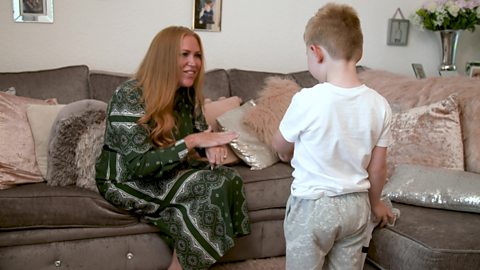Rhyming games are key to helping children with their understanding of different word sounds and the rhythm of words. This can be hugely helpful for their language skills as they build to talking in sentences and eventually reading.
Take a look at the video below for some inspiration for all sorts of rhyming fun.
What are phonics?
When your children are approaching nursery or school age your childβs setting may introduce βphonicsβ.
Phonics is a way of teaching children how to read by matching sounds to letters. Sometimes there are a few letters that represent the same sound eg a βkβ sound might be spelt with a c (attic), a k (bark), or a ck (back).
Phonics just means matching the sounds that make up different spoken words to individual letters or groups of letters.
The more your child hears words, the easier it is to match them to written words when they are introduced to phonics at school or nursery.
What does phonological awareness mean?
Phonological awareness is an understanding of the different sounds that make up spoken words in a language. It is the ability to recognise when these sounds are the same and when they're different.
It also involves skills like recognising how many beats (syllables) are in words, recognising that some sounds rhyme and that some sounds are similar.
Nursery rhymes and songs are ideal for children to hear all sorts of rhyming sounds and emphasise the rhythm of words.
Recognising these word sounds is a big step towards being able to read, as they later learn which letters on the page create those sounds when they're read out loud.
Rhyming and phonics games to try
- Simply ask your child 'what rhymes with�' - this can work even better when you're out and about and there's lots of inspiration in the things you can see and hear. For example, if you see a dog on a walk in the park, you might ask 'what rhymes with dog?' and if you heard a car in the street, you might ask 'what rhymes with car?'
- You could challenge your child to name as many rhymes for one word that they can. So you could start with 'dog' and ask them how many word they can name that rhyme like 'frog', 'log', 'bog' etc
- You could play a version of 'I Spy'. Take turns to say 'I spy with my little eye, something beginning withβ¦" and instead of the saying the letter's name, say the sound that the word begins with
- You could set your child off on a sound treasure hunt to see if they can find as many items as they can whose names begin with a certain sound
- Emphasise sounds when you read and share books with your child
The importance of nursery rhymes
Nursery rhymes are much more important to children's language development than you might think. They help them to remember certain words, understand word sounds and develop children's listening skills.
Find out more about the benefits of rhymes in the video below.
Benefits of nursery rhymes
Nursery rhymes are great for building phonological awareness from an early age as they help children to hear and recognise rhyming sounds, while the rhythm and rhymes can also help children understand where words and sentences begin and end*
Not only that, but nursery rhymes have plenty of other benefits too.
- They introduce children to words they might not hear in everyday life in a fun, repetitive way
- Actions improve children's motor skills and help them to remember the words
- Repetition helps children to predict what comes next, which gives them a hit of dopamine, the happy hormone. The more they repeat rhymes, the more likely they'll remember the words in them






